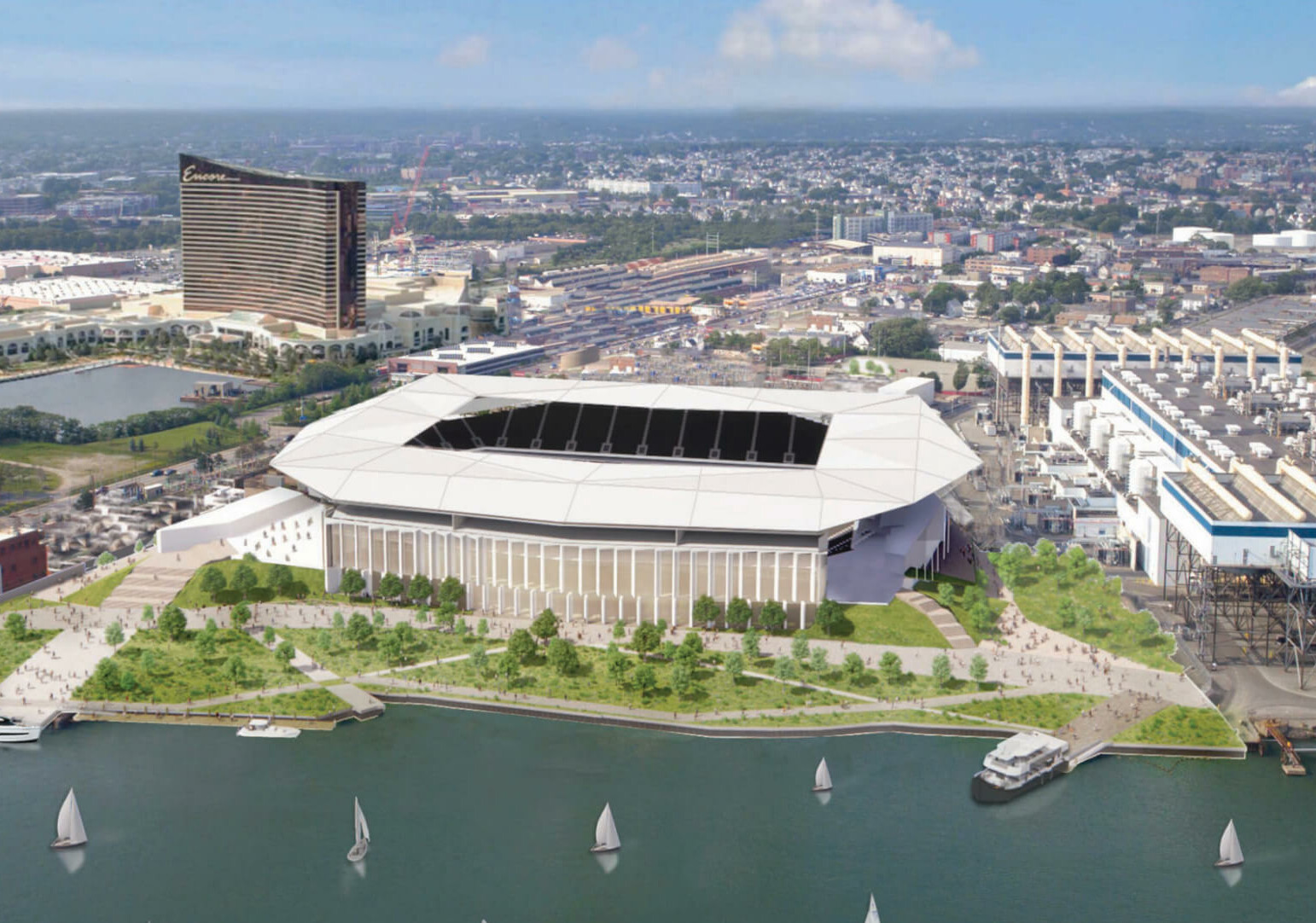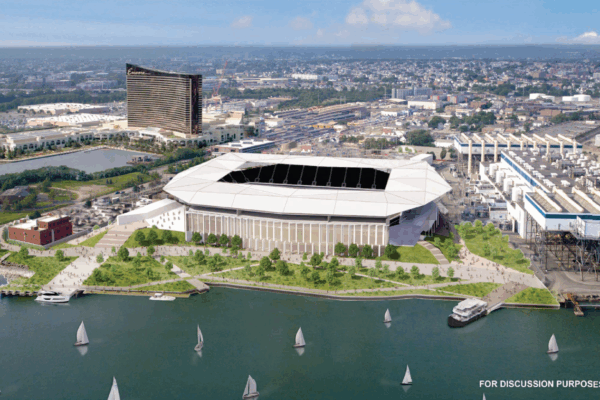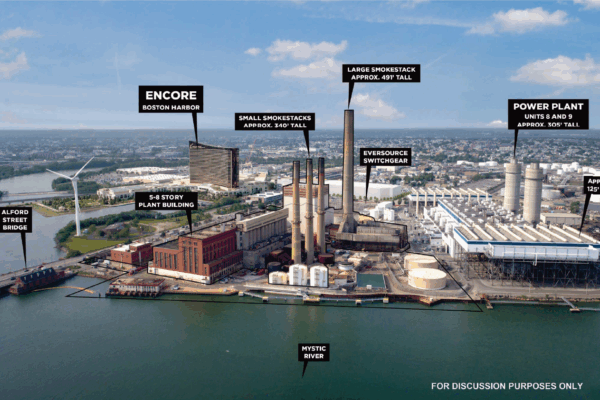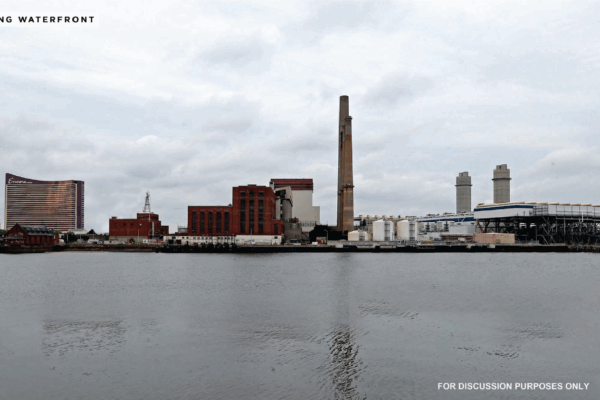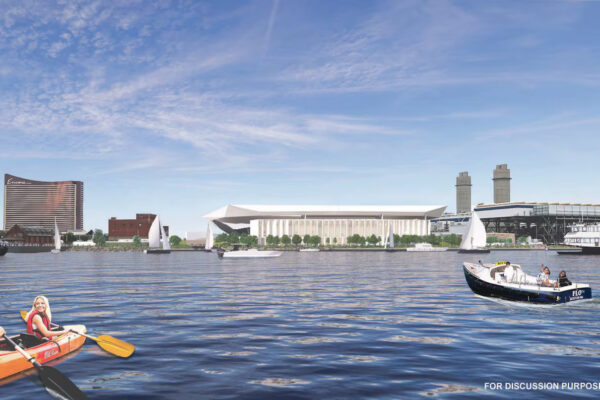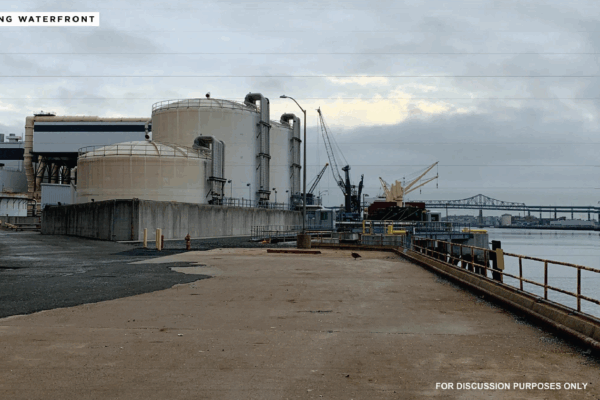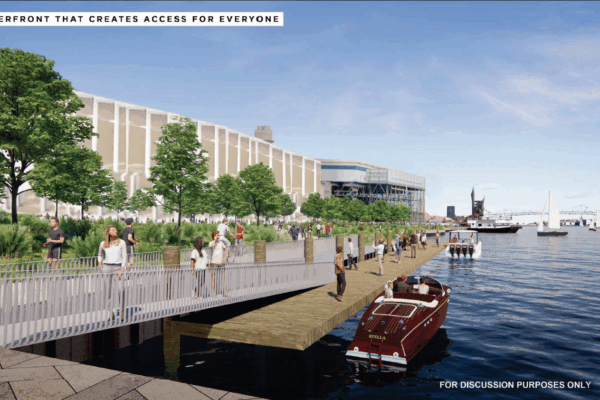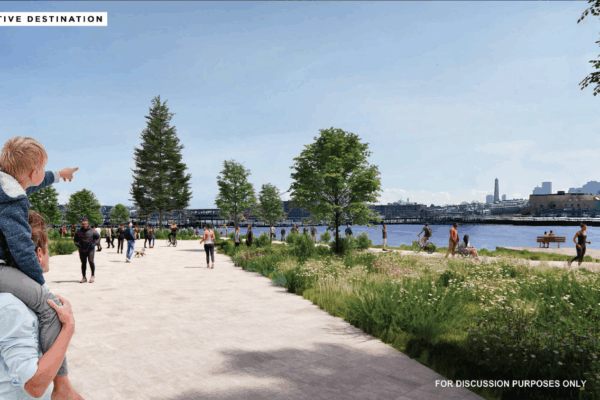The City of Everett, together with the New England Revolution and private partners, is exploring the development of a new, 25,000-seat soccer stadium and adjacent waterfront public space on the former Mystic Generating Station site along the Alford Street corridor. This project is a private investment intended to convert a largely underutilized, industrial parcel into a mixed-use destination with recreational, transit, and economic amenities.
Community Questions
In recent months, multiple public meetings and community conversations have been held to provide updates, share preliminary designs, and hear residents’ questions and feedback. The questions below come from both formal city-hosted forums and follow-up communications, representing the most frequent and pointed areas of interest and concern raised by Everett and neighboring communities.
Please note that this is a proposed project—many aspects are still under consideration, and no final decisions have been made at this stage. The purpose of sharing these questions is to ensure transparency, foster dialogue, and address community priorities as the planning process moves forward.
Stadium Use & Events
We are presently in the pre-permitting phase of the stadium. As part of the legislation to remove the parcel of land from the Designated Port Area (DPA), community impact agreements must be entered into between the site owner and the Cities of Everett and Boston. Neither Everett nor Boston have finalized their community impact agreement with the site owner.
If the Cities of Everett and Boston execute their respective community impact agreements, the stadium and waterfront park project may then be officially proposed through an application to the City of Everett’s Planning Board. During (or following) the local Site Plan Review process, the project will also need to go through their State approval processes, including the wrap-around MEPA (Massachusetts Environmental Policy Act Office) review process and Chapter 91 license review through MassDEP. These processes will include public input.
Yes. In addition to Revolution games, the stadium and waterfront park will also be made available for concerts and other public, community-driven events, such as farmers markets and soccer clinics.
Regulations on how late the stadium can stay open are a local decision and have not yet been finalized. The City will have the ability to license events at the stadium, considering the nature of the event, its duration, and impacts on the community. Most MLS matches and concerts will occur during off-peak hours on Saturday evenings, with occasional weekday events.
A wide variety of events is expected, including soccer matches, concerts, farmers markets, and graduations. Events will take place year-round, mostly in the summer months. The City does not yet have a total number estimate.
Multiple options may be established, including shuttles to and from the stadium and/or agreements with nearby private lot owners to utilize adjacent land for temporary parking for students, families, and the public.
Yes. There will be limited parking spaces available at the stadium and waterfront park. Depending upon the event, the City expects the event sponsor to investigate opportunities such as tailgating to enhance the fan experience. The City will review all proposals submitted by the event sponsors.
The community’s input will be solicited to determine features in the waterfront park, including playgrounds and recreation options.
Transportation & Infrastructure
Relying on on-site parking is not possible due to limited space and roadway capacity. Access to the stadium will use a combination of MBTA transit, supplemental shuttles from nearby stations, and satellite parking lots with dedicated shuttles. The Event Transportation Management Plan (ETMP) is still being developed and will be guided by permitting (MEPA and local site plans). The ETMP aims to encourage public transit use and ensure full accessibility for seniors and people with disabilities. All access will be ADA-compliant, including shuttles for those with mobility needs.
Water taxis/ferries are planned as part of opening the Everett waterfront for public access. Specific docking and departure locations will be determined through the permitting process.
Decisions on improvements to major infrastructure will be determined through state permitting (MassDOT) once the stadium files for environmental review. Some alterations and/or improvements to roadways, bridges, and pathways are likely to be required.
Yes. Required infrastructure improvements must occur prior to the stadium opening, in coordination with local and state agencies.
Public safety and security is a top priority. The City will make this determination as the project proceeds through the permitting process.
State and local emergency officials, together with the New England Revolution, will develop a robust emergency management plan during site planning.
Yes. Improvements to sidewalks, bike lanes, and paths connecting existing trails (e.g., Everett Riverwalk, Northern Strand Trail) with new pathways (e.g., along the Mystic River, underneath the Alford Street Bridge) are planned in cooperation with state and local authorities.
All pathways will be designed to comply with state and local building codes to ensure public safety.
State law will require ADA-compliant parking. Exact numbers will be determined through permitting.
No. These infrastructure projects are independent of the stadium and are prioritized by MassDOT and the MBTA, though private developer contributions may support them.
Community Impact & Safety
Construction is expected to begin after removal from DPA status, with an estimated timeline of about four years for demolition, remediation, and stadium/park build. That estimate, however, is dependent on the timing of the DPA removal pursuant to the Mass Leads Act.
This is where we need as much community input as possible. Comments and discussions that occur during our community events have a direct impact on the drafting of the City of Everett’s community impact agreement (CIA) proposal. Conditions within the community impact agreement are actively being discussed between the City of Everett and the site owner. If community impact agreements between the site owner and Everett and between the site owner and Boston are not reached before the start of 2026, the relevant parties will be required to enter into a binding arbitration. If binding arbitration occurs, the arbitration panel will be tasked with making the final decision on the terms and conditions of the applicable community impact agreement.
Events may require additional police and fire details, paid by the stadium operator. If needed, outside teams (private security, State Police) would supplement coverage to ensure the rest of the City remains protected. There will never be a lack of emergency personnel for the rest of the City during events.
The owner/operator will be responsible for taxes. Projected payments from the stadium are expected to exceed current revenue from the site. Because the project is still in its early stages (as of 9/30/25), specific amounts and payment structures are not yet known.
Unlike White Stadium, no local public funds are being dedicated to the Everett project. That said, both the White Stadium project in Boston and the proposed Revolution Stadium project in Everett are fully distinct from one another and the review process of one should have no impact on the review process of the other.
Part of the legislation that will remove this parcel from its status as a “Designated Port Area” requires the site owner enter into a Community Impact Agreement (CIA) with both Boston and Everett. How future administrations may navigate the CIA process is uncertain.
Environmental & Quality of Life
The stadium and waterfront park will comply with all applicable environmental, energy and noise-related laws and regulations. The stadium will also work with the City of Everett on the design and implementation of a waste management plan that prevents trash associated with the site from entering the Mystic River.
The City expects that the waterfront park will be available to City residents and visitors at all times other than when large events, such as MLS soccer matches, are being conducted at the stadium. During those large events, the City will work with stadium management to make the waterfront park available, though there may be restrictions or limitations for security.
Land Use & Alternatives
The Mystic Generating Station has been out of use for several years:
- Units 1-6 retired in 2003
- Units 1-7 (45 acres) decommissioned in June 2022
- Units 8 & 9 (26 acres) decommissioned May 31, 2024
The 45-acre parcel was purchased in 2023. The City is unaware of other offers to purchase the parcel.
Without a stadium, the land would remain privately owned, and the City would have no authority or funding to remediate it.
No. See below question for further information.
Yes. The site is in a Designated Port Area (DPA). Legislation allows only a professional stadium and waterfront park; otherwise, it must revert to industrial/marine-dependent use.
Go Deeper: The legislative language (contained within the 2024 Economic Development Bond Bill) which removed the parcel of land from the Designated Port Area states the following:
- Section 305.
- (a) Notwithstanding any general or special law to the contrary, a certain parcel of land located at 173 Alford street situated partly in the city of Everett and partly in the city of Boston shall be removed from and not be considered to be within the boundaries or a part of the Mystic River designated port area pursuant to 310 C.M.R. 25 and 310 C.M.R. 9 or any other applicable law, rule or regulation to convert the parcel into a professional soccer stadium and a waterfront park. …
- (b) If the professional soccer stadium and waterfront park fail to be permitted and constructed within a reasonable time after the effective date of this act, as determined by the secretary of energy and environmental affairs, subsection (a) shall be void and the port area designation and corresponding use restrictions under 310 C.M.R. 25 and 310 C.M.R. 9 shall be restored to the parcel; provided, however, that such determination of a reasonable time period shall not be made earlier than 5 years after the effective date of this act.
So, if a stadium is not built on the site, it will revert back to its Designated Port Area status. If it reverts back to a DPA, the only allowable uses would be “marine-dependent, industrial use”. So, the only options are (1) a Professional Stadium and Waterfront Park or (2) A marine-dependent, industrial use. It would not be permissible to construct housing, retail, schools, commercial spaces, etc. on the site, as those are not allowable uses within a DPA.
Environmental groups, which exercise some authority over DPAs, did not want to remove this parcel from a DPA without a guarantee that a redevelopment on the site would provide extensive public access to the waterfront. A simple removal from the DPA without such limiting language could have opened the doors for a housing developer to purchase the property, construct multi-million-dollar condos, and privatize the entire 45-acres of land/waterfront. This language ensures that the parcel will serve all of Everett’s residents instead of the interests of a few.
Ownership & Accountability
The construction of the stadium and waterfront park will be 100% privately funded. The City of Everett will not be obligated to fund any portion of the remediation of the site, the construction of the stadium or waterfront park, nor the operation of the stadium.
MLS teams often develop stadiums in metropolitan areas. The Revolution aim to transform a blighted site and bring economic opportunity and community pride to Everett.
All commitments remain in effect for the project’s life. If the stadium isn’t built, the parcel reverts to DPA status.
The Mass Leads Act requires the site owner and the City of Everett to enter into a community impact agreement for the parcel to be removed from the DPA. The community impact agreement is enforceable against the parties. The parties are currently negotiating the community impact agreement and more information will be announced at a later date.
Abutting properties can provide input during local and state review but cannot unilaterally block construction.
No. The City has held community meetings to gather resident feedback, and the Revolution plan to host smaller, local “coffee hours” to hear directly from residents.
Site Images & Renders
Photos show the current site. Renders are conceptual and for discussion purposes only; final designs may change.

